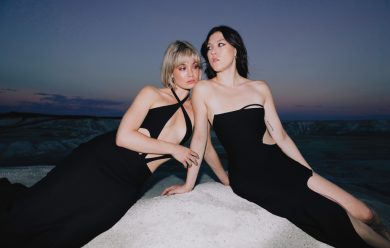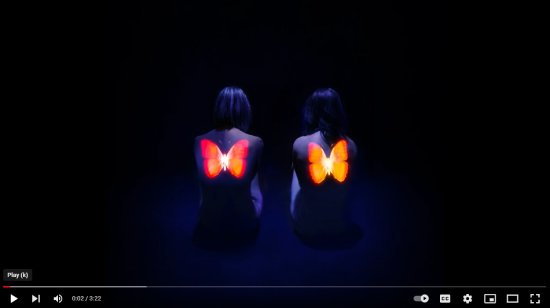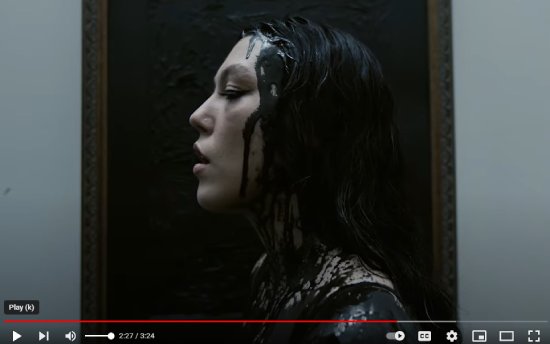Meeting Charlie Kunce-Belhadj and Emma Cochrane, one immediately notices the nascent passion and youthful ardour that fuel their desire to kock on every door – and break it down, if necessary. Their musical project, Mayfly, grew slowly over time, and is rooted in a friendship that allows them to become the best possible version of themselves.
 “We met in the Creative Art program at Champlain College in Sherbrooke, and we both already knew that we wanted to pursue our passion for music, no matter what,” says Kunce-Belhadj. Their motivation was completely free of doubt. Their HIDEAWAY Vol. 1 EP, which was released in January of 2023, is the first half of a two-tiered whole, and the first step toward their shared dream.
“We met in the Creative Art program at Champlain College in Sherbrooke, and we both already knew that we wanted to pursue our passion for music, no matter what,” says Kunce-Belhadj. Their motivation was completely free of doubt. Their HIDEAWAY Vol. 1 EP, which was released in January of 2023, is the first half of a two-tiered whole, and the first step toward their shared dream.
Rarely sitting at the same table to create, the duo generally proceed with Kunce-Belhadj’s music and Cochrane’s lyrics – although sometimes the former will create a fully formed song based on three chords proposed by the latter, and vice-versa for the lyrics. “We know each other so well that we can write about the other’s wounds without asking questions,” Cochrane confides. “We’ve been together 24/7 since we were 19 years old.”
At that age, the two young women chose to live in the city to make things happen. “For us, it was Montréal or nothing,” says Cochrane. “We knew that was where we’d be able to learn by doing.” And rather than pursuing musical studies, or some similar form of training, they chose to go all-in with networking. “We didn’t know anyone, but we knew that contacts are at the very heart of this trade,” Cochrane explains. “So, we’d put everything we did online. We are fully self-taught, from marketing, to aesthetics, to building our social networks. That’s what allowed us to meet people.”
Artistically, the modus operandi has always been carte blanche, and an irrepressible desire to forge ahead. “When we moved to Montréal, we spent our entire savings on buying equipment, and building a studio in our apartment,” says Kunce-Belhadj. “Our good friend Jules [Bonneville-Coulombe] was a trigger. We did our first shows with him, as well as a few performances in cafés to build our confidence.” Then came Les Francouvertes in 2021, which paved the way for things to come; even though Mayfly didn’t move on in the contest itself, that’s where their record label discovered them. Duprince Records has been grooming the duo for almost two years. “The things that have happened to us since have been exponential,” adds Kunce-Belhadj.
Although the songs they presented during Francouvertes had to be in French, they undoubtedly feel more comfortable singing in English because it “allows us to go further.” “We weren’t at all confident in our Franco catalogue when we got to the Francouvertes,” says Kunce-Belhadj. “We feel like we’re playing a character when we write in French.” “French is our native language,” says Cochrane. “It’s going to be obvious on volume two of HIDEAWAY. A sentence in French is always more personal, and that can be intimidating. We can be more open in English.”
Alongside Adrian Villagomez, they developed their visuals and music videos that are true to themselves. “We admired him, so we used the 2020 method and DM’d him,” the women say with a giggle. They’re satisfied with everything that’s come out of that collaboration, which allowed them to create a visual universe true to what they had imagined. “Our music is our bubble, it’s a safe space. We want our album to come across as a statement, a dark but danceable moment, that’s both wistful and hypnotic,” says Kunce-Belhadj. “It’s a bit like the album as a whole [volumes one and two] was an avowal: you have emotions to live through, and it’s OK to feel them.”
Kunce-Belhadj admits that Mayfly’s music was “embryonic and unclear” when they enlisted for Francouvertes. “During the pandemic we found the intention of our project,” she says. “We wanted to make sure our label felt they made a good choice when they picked us. We worked really hard to fine-tune our sound.”
They found that finesse at Homy Studio. “We needed backup and better material,” says Kunce-Belhadj. “We knew Hologramme. We told them, ‘Here’s our project and its essence.’ We spent two months in the studio with them, and everything we’d done up to that point was the same but sounded better. Analog sounds, layers, textures… Everything was prettier. Working on a project with six heads instead of two was a challenge, but the result is exactly what we wanted.”
Whereas Volume 1 was an introduction, Volume 2 will be the “A-ha!” moment when the emotions and desires have been recognized, and everything left to be expressed will be said out loud. “Volume 2 will be the cherry on top,” Kunce-Belhadj. “It has a bit of everything: big Franco pop, American rap. We express our feelings, ranging from hate, to joy, to fatigue. 2023 is the year of letting go.”

